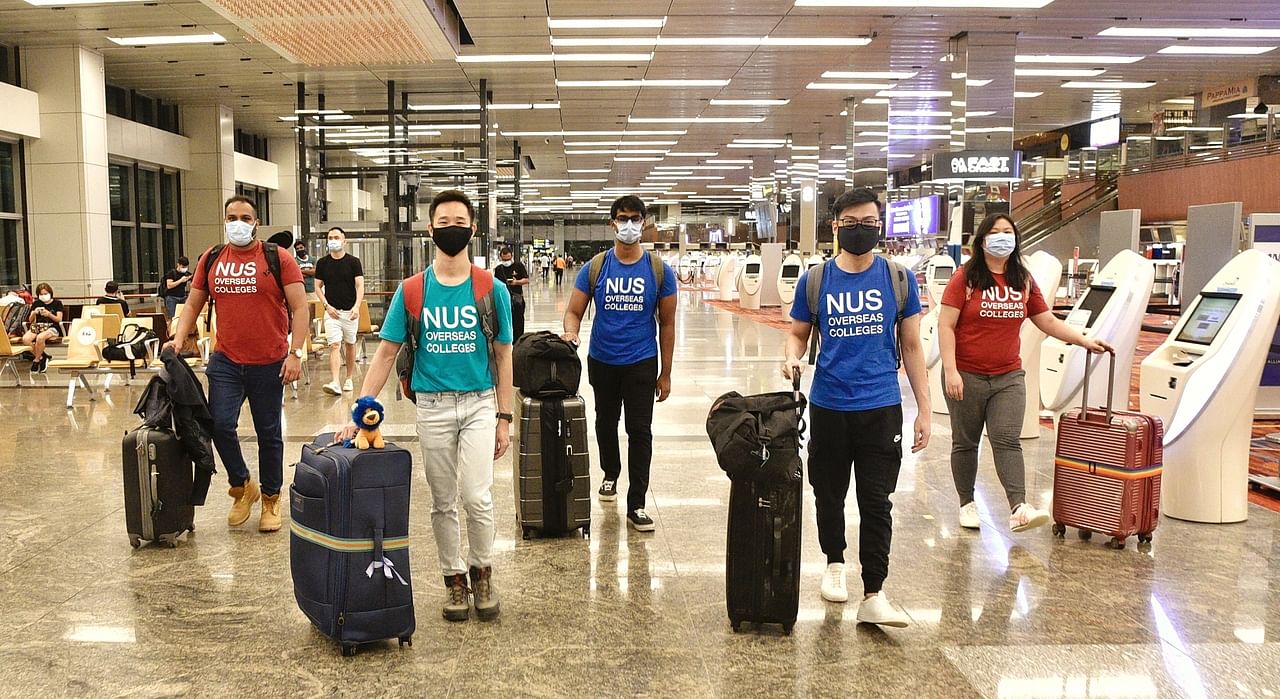NUS' budding entrepreneurs among first students to head overseas for internships
Sign up now: Get ST's newsletters delivered to your inbox

(From left) Mr Kiran Prabakaran, Mr Alvin Tay, Mr V C Vikaram, Mr Augustine Chia and Ms Han Xin Yun at Changi Airport Terminal 1 on Oct 6, 2021.
ST PHOTO: DESMOND WEE
SINGAPORE - National University of Singapore students Augustine Chia and Alvin Tay were part of a seven-member team that came up with an idea for a 3D-printed, customised mask for children suffering from sleep apnea.
The continuous positive airway pressure mask went on to win two awards, including the James Dyson national award last year.
The two biomedical engineering students, who are passionate about medical technology solutions to help people, and their teammates are keen to improve the product and take it to market.
Realising they needed to learn more about product development, marketing and securing investors, they signed up for the NUS Overseas Colleges (NOC) programme in January this year despite being told it would be conducted online.
Under the programme, which aims to nurture entrepreneurs, they went on to work with start-ups in Stockholm, a city known for its medical technology start-ups.
Before Covid-19, about 300 students would head out yearly to different business nodes in the world, including Silicon Valley, New York City, Stockholm and Israel, to work in start-ups and take up courses in partner universities.
Last week, Mr Chia and Mr Tay flew to Stockholm with three other students to work with the companies they had been interning with remotely.
They are among the first NUS students to resume student exchanges and internships since March 2020, when several hundred NUS students overseas were asked to return home amid the Covid-19 pandemic.
NOC officials said about 80 students will be leaving over the next four months for Silicon Valley, New York, Stockholm, Munich and Toronto as part of the programme.
Professor Chee Yeow Meng, associate vice-president of innovation and enterprise at NUS and director of NOC, said the programme has been an influential force behind start-ups in Singapore, including two unicorns - PatSnap and Carousell - that are valued at over US$1 billion (S$1.36 billion).
That is why NUS felt it was important to keep the programme going despite the travel disruptions brought on by Covid-19. The NOC team replicated as much of the overseas experience as possible for the students.
Said Prof Chee: "But we also asked ourselves whether we can still keep to the purpose and rigour of the programme, operating in pandemic mode.
"By having students do remote internships for start-ups in NOC locations, and for them to have access to the same slate of mentors and coaches in those locations as before, we found that we can achieve the same purpose and rigour.
"We also held Zoom sessions to bring entrepreneurs and venture capitalists from these NOC locations to engage with our students. In addition, students continued to take courses virtually from our partner universities when available."
But Prof Chee added that NUS switched back to overseas attachments as soon as it became possible for students to travel again.
"We recognise there are some elements of overseas experience that cannot be replicated - the independence, serendipity, adventure and wonder that come from travelling. Being in a new place drives a spirit of adventure and curiosity. If we can provide this experience, even for a few months, we should do so," he said.
The students heading overseas echoed his sentiments.

Mr Chia, 24, who will continue his internship as a business development associate in a medical tech company in Stockholm, said: "Despite working online and in a different time zone, they kept me busy and I learnt a lot. But it's nothing like being in the same office as your colleagues - it will be a much more intense working environment and I am sure I will learn so much more."
Mr Willy Seah, 24, and Mr Sean Lew, 24, who will be heading to Silicon Valley by the end of the month, are also keen to be in the famous entrepreneurship hub in the United States.
"I have heard so much about the Silicon Valley environment and culture and can't wait to experience it for myself," said Mr Lew, while Mr Seah, who studies computing, said he intends to take part in weekend hackathons to hone his skills and network.
The two, who are already working on a start-up idea that helps online clothing stores reduce return rates due to wrong sizing, hope to develop their idea further.
NUS officials said various measures have been put in place to ensure the safety of the students. Besides allowing only vaccinated students to travel, NOC staff have a monitoring system to track border policies, the pandemic situation, vaccination regime, and safe management measures in overseas locations where its students are.
NUS said it will monitor the health and wellness of its students throughout their overseas stint, and will not hesitate to bring them home if the situation in their locations warrants it.
Despite the pandemic causing major disruptions, Prof Chee said it has also spurred entrepreneurs around the world to come up with bold, new ideas.
He added: "Something happens to our students when they head overseas - they come back bubbling with ideas and, more importantly, the derring-do, know-how and confidence to turn these ideas into products.
"That was what happened with the Carousell and PatSnap founders. We hope the current batch of students going out will come back with some interesting new ideas that NUS can help them build on."


